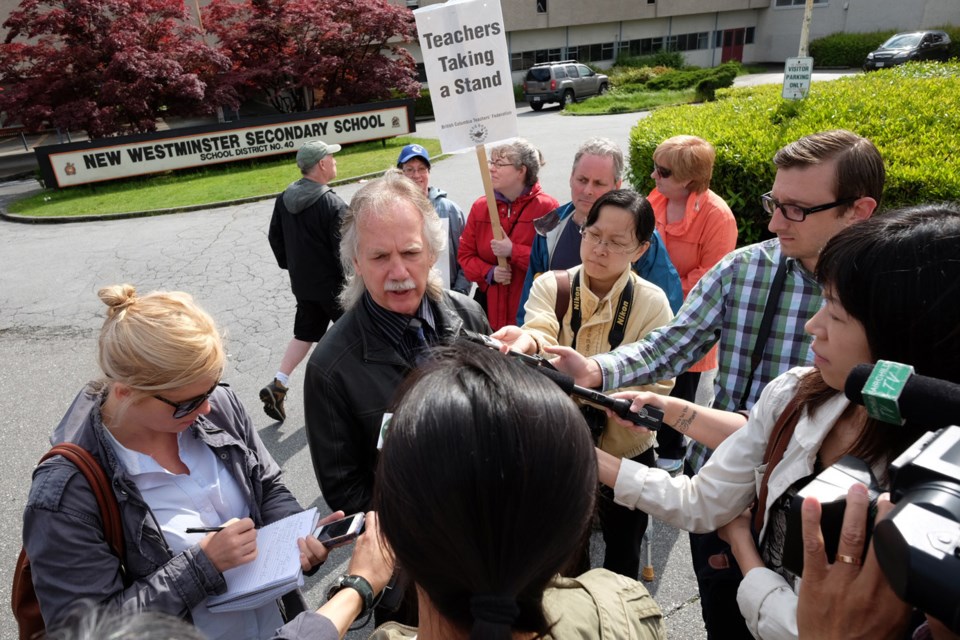British Columbia Teachers’ Federation president Jim Iker joined New Westminster Secondary School teachers on the picket line for the first day of “stage 2” strike action on Monday.
Iker turned up to take questions from media and to support to local teachers, who were generally upbeat, waving when motorists drove by and honked in solidarity.
“We here taking a stand for a fair deal for teachers, which includes better supports for our students,” Iker told The Record. “We are hoping that our first day of our stage-2 action will get government to come to the bargaining table this afternoon in good faith and bring the necessary funding that it will take to get that fair deal.”
New Westminster and Vancouver are the first two districts in Metro Vancouver to participate in the rotating strike as teachers escalate job action in response to fruitless contract negotiations with the B.C. Public School Employers' Association – the bargaining agent for the province's 60 school boards.
One of the key issues for teachers that government has been unwilling to move on, according to Iker, are class size and composition.
Also at issue, the government is offering a 7.3 per cent wage increase over six years, while teachers want 13.7 per cent over four years.
For New Westminster Secondary School teacher Jonathan Sykes, being able to negotiate class size and composition is the most-important aspect of contract deliberations.
“The wage isn’t even an issue. I’d love to make more money, everybody would – (but) that’s not why I’m here,” Sykes said. “I didn’t become a teacher so I could make a ton of money. I think you’d be hard-pressed to find any teacher that would say they they’re on the line today because they want to get paid better.”
Explaining how composition impacts teaching, Sykes painted a picture of his music composition class. Currently, he has five students who are new to Canada and speak limited English, two with severe autism, one student who is blind, two students with behavioural designations and three with learning disabilities.
“I’ve heard this saying, ‘They’ve lowered the bar, so people can kind of trip their way over it,’ … it’s kind of sad,” Sykes said. “We are going to see it down the road when we have a workforce of people who aren’t able to problem solve, who aren’t creative, who are only able to do the minimum.”
The ongoing labour strife between the union and the government ramped up last week, when the B.C. Public School Employers’ Association ordered a lockout and pay cut for teachers who participate in the weeklong job action. The partial lockout restricts teachers from working during recess or lunch hours, or from arriving at school any earlier than 45 minutes before school starts, or staying later than 45 minutes after school ends.
“Government has done this for the sole purpose to try to build a case to dock our pay 10 per cent,” Iker said. “We are going to Labour Relations Board on Thursday to deal with the issue. Let’s wait till Thursday to see what happens.”
Iker wants the government to withdraw the partial lockout letter, which he said has created a “lot of chaos and confusion” for teachers, parents and students.
Iker joined the striking New Westminster teachers in front of the high school before heading out to attend contract negotiations scheduled to resume in the afternoon.
The Ministry of education issued a statement in response to The Record’s request for comment.
“It is unfortunate that the BCTF leadership is shutting down schools with their rotating strikes – it is always students and parents who bear the greatest brunt when the BCTF orders teachers to walk out,” Education Minister Peter Fassbender is quoted in the statement.
He blames the union for the ongoing and says the employers' association presented incentives, including a $1,200 signing bonus, and asked the union to put strike action on hold.
“The BCTF refused. When it was made clear that if the union continued with its partial withdrawal of services, BCPSEA would need to respond with a corresponding reduction in teachers’ pay,” Fassbender said in the statement. “We want to see a negotiated settlement and BCPSEA is ready to bargain 24/7, anytime, anywhere. BCPSEA has a fair offer on the table. However, the BCTF leadership is asking for a pay increase and other benefits that are more than four times what other public sector unions have recently settled for and their total demands are well beyond what taxpayers can afford. That remains a key stumbling block to meaningful bargaining.”



